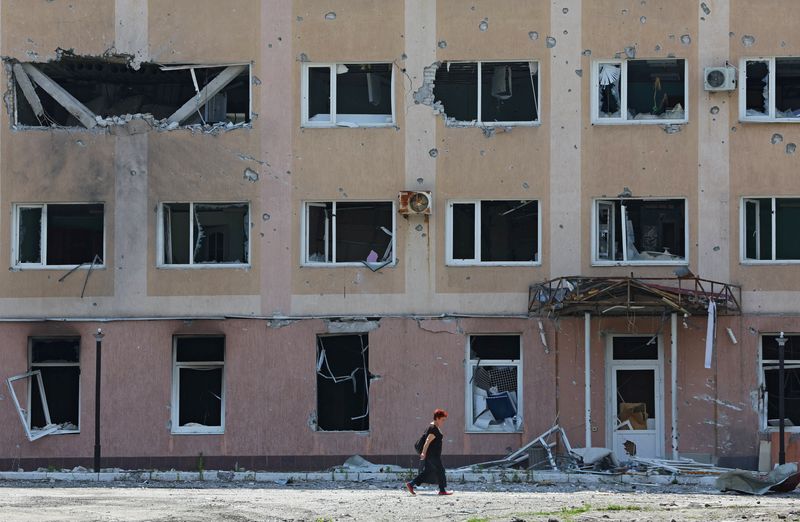Russia hails capture of Luhansk region, but big Ukraine battles lie ahead
2022.07.04 21:35

Though Russia can claim a prize with its capture of Ukraine’s eastern Luhansk region, it is far from Moscow’s ambitious early war aims and does not deal Kyiv a decisive military blow.
The Russian assault will now switch its focus to the rest of the Donbas industrial heartland, but Kyiv will find it easier to defend fortified positions in Donetsk region and the battles that will shape the war’s course still lie ahead, military analysts said.
“I think it’s a tactical victory for Russia but at an enormous cost within the context of redefined military goals,” said Neil Melvin, a London-based RUSI think tank analyst.
Russian President Vladimir Putin congratulated his troops on Monday for “liberating” Luhansk region, promising medals for heroism and saying that soldiers should get some rest. Three Russian cosmonauts sent a celebratory message from space.
It is a milestone for a war machine that abandoned an assault on Kyiv in the conflict’s early weeks to focus on capturing the Donbas, made up of Luhansk and Donetsk – swathes of which Kyiv still controls.
Russia says it wants to wrest the Donbas from Ukraine on behalf of Moscow-backed separatists in two self-proclaimed people’s republics whose independence it recognised on the eve of the war.
The Battle for the Donbas began around mid-April and it has taken since then for Russia to drive Ukraine from just Luhansk, a large chunk of which was already held by Moscow-backed separatist proxies before the Feb. 24 invasion.
“This (the capture of Luhansk) is a redefined objective and a very small objective in a way. And Russia has put its full military force into achieving this goal and still it has taken nearly 60 days,” Melvin said.
Russia’s initial war aims went far beyond the Donbas and capturing Luhansk region, and likely included a change of government or at least altering ex-Soviet Ukraine’s westward orientation, said Rob Lee of the U.S.-based Foreign Policy Research Institute. They also included “de-militarising” Ukraine.
“Clearly Russia had more ambitious aims at the beginning of the war,” he said.
‘IT HURTS A LOT’
Russia has switched its battlefield tactics, using long-range shelling to force Ukrainian forces from positions before sending in ground forces, making slow, grinding progress reminiscent of World War One, analyst say.
“This isn’t a way to build momentum; they’re taking relatively small amount of territory each day and in the context of modern warfare, this is very slow progress. The Russians are burning through their advanced equipment and personnel, so they are paying a price for this,” said Melvin.
Ukraine’s governor of Luhansk region told Reuters its capture after Ukraine withdrew from Lysychansk city was a “painful” loss, but that it had saved soldiers from being completely surrounded and pounded by artillery.
“In terms of the military, it is bad to leave positions, but there is nothing critical. We need to win the war, not the battle for Lysychansk,” Governor Sergiy Gaidai said.
He predicted Donetsk region’s city of Sloviansk and town of Bakhmut would be the targets of Russia’s next offensive. He urged foreign powers to step up heavy weapons supplies, saying the West had “understood too late” the situation in Ukraine.
The invasion has killed thousands, displaced millions and flattened cities, particularly in Russian-speaking areas in the east and southeast of Ukraine.
Kyiv and the West say Russia is waging an unprovoked war of aggression and accuse Moscow of war crimes. Moscow denies that and calls its actions a special military operation to degrade Ukraine’s military, root out dangerous nationalists in power and protect Russian speakers from Ukraine.
KEY BATTLE YET TO COME
Lee said it had been hard for Ukraine to hold positions in Lysychansk and the city of Sievierodonetsk, another frontline stronghold that fell on June 25, both of which lay on Ukrainian-held land that jutted into Russian-held territory.
Kyiv was unable to send heavy artillery and air defences to cover its troops there because they would have been exposed, a disadvantage it will not have if a new defensive line takes shape near Sloviansk and nearby Kramatorsk, he said.
“That kind of line should be easier for Ukraine to defend with long range artillery and long range air defence systems, so they can use that to provide cover so they get the Ukrainian troops fighting there because they’re not in this deep salient,” he said.
He predicted Russia might make more small gains in the east in the meantime.
Russia, which annexed the peninsula of Crimea in 2014, captured swathes of southern Ukraine, claiming control of the strategically important Kherson region that looks out onto the Black Sea and where Ukraine says it plans a counter-offensive.
The key battle of the war is still yet to come and Ukraine likely sees its counter-offensive in Kherson as of greater strategic importance than the fight for the Donbas, said Melvin.
“The Battle in Donbas is not going to be the strategic battle for Ukraine; that battle is likely to take place in the south,” he said.








